
 *****Music Theater Works’ production of the Tony Award-winning musical “Pippin” is one like no other! The first thing that the audience observes as we walk into the theatre is the eclectic-looking stage filled with objects from pop culture. We see a series of balconies backed by solid scarves of vivid colors with a chandelier in one box, a box filled with toys in another, and still another containing a large bejeweled Cross. Most noticeable, however, are the multitude of flickering TV and computer monitors, set to different programs. Featuring film clips and animation, largely spanning the years between 1980 and 1992, the constantly changing screens add to the psychedelic unreality of the setting, thanks to scenic designer Shane Cinal. Meant to be anachronistic, comical, and highly entertaining, the performance takes us through the life course of Pippin (Connor Ripperger), a fictional man who is being guided in his decision-making by The Leading Player (Sonia Goldberg), dressed in red and black. As she offers him suggestions on how to find fulfillment in life, the audience can guess that this beguiling temptress is actually Satan, who is interested in obtaining souls after death. With his strong voice and just the right touch, Ripperger plays Pippin to perfection and neatly carries the entire show.
*****Music Theater Works’ production of the Tony Award-winning musical “Pippin” is one like no other! The first thing that the audience observes as we walk into the theatre is the eclectic-looking stage filled with objects from pop culture. We see a series of balconies backed by solid scarves of vivid colors with a chandelier in one box, a box filled with toys in another, and still another containing a large bejeweled Cross. Most noticeable, however, are the multitude of flickering TV and computer monitors, set to different programs. Featuring film clips and animation, largely spanning the years between 1980 and 1992, the constantly changing screens add to the psychedelic unreality of the setting, thanks to scenic designer Shane Cinal. Meant to be anachronistic, comical, and highly entertaining, the performance takes us through the life course of Pippin (Connor Ripperger), a fictional man who is being guided in his decision-making by The Leading Player (Sonia Goldberg), dressed in red and black. As she offers him suggestions on how to find fulfillment in life, the audience can guess that this beguiling temptress is actually Satan, who is interested in obtaining souls after death. With his strong voice and just the right touch, Ripperger plays Pippin to perfection and neatly carries the entire show.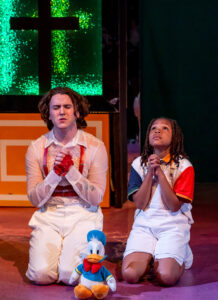
This iteration of the original 1972 musical, with music and lyrics by Stephen Schwartz and book by Roger O. Hirson, is still very relevant despite the fact that it was penned fifty years ago. The two-act show catalogs Pippin’s journey through struggles and setbacks that do not take place during his actual lifetime. Rather, his story is a throwback to a much earlier era, that of “780 A.D. or thereabouts”, according to dramaturg Nathan J. Lamp. As Pippin lies in bed sometime in the early 1990s, he has a vivid dream of having lived before, namely, during the time period of the Holy Roman Empire. Initially very studious and a graduate of the University of Padua, Pippin wants to find life’s meaning, which he initially associates with furthering his manhood. So he decides to go off to war, which, for centuries, has been considered a widely celebrated formula for becoming a man. In so doing, he overcomes his sibling rivalry with his queer crossdressing brother Lewis (Andrew Freeland) and gains the affections of his father, who happens to be Charlemagne (Thomas M. Shea), otherwise known as Charles the Great. His mother is the sexy, power-hungry Fastrada (Savannah Sinclair). Then there is Kathleen Puls Andrade, who plays Pippin’s grandmother Berthe in an outrageously wonderful performance. She steals the show with her sensually tinged body language and her frank interaction with the audience. Her song “No Time at All” is extremely comedic and memorable.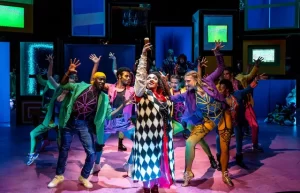
When Pippin finds being a warrior to be unfulfilling, he turns to romantic and casual love in all its forms. When that no longer satisfies, he desires to become the ruler of the roost, which also turns out to be unsuccessful. Later he marries Catherine (Desiree Gonzales) and adopts her son Theo (Di’Aire Wilson), but family life does not make him happy either. (Now there is a brief hint in the story that it is only in relation to the creative arts that one can achieve true happiness, but I digress here.) As Pippin becomes less idealistic and more practical as he grows older, he also becomes more and more itchy with each of the life decisions he has made. None of his explorations and ventures please or gratify him. With fulfilment in any endeavor seemingly ever-elusive and with his being unwilling to settle for anything less than perfection, Pippin constantly fights against his present situation and moves on to a new one, which then becomes tiresome and inadequate in some way.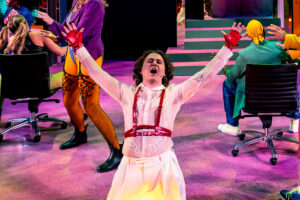
I cannot rave enough about the production’s creativity! Director Kyle A. Dougan, assistant directors Sasha Gerritson and Patrick Tierney, and music director Justin Akira Kono have created a masterpiece of artistry, together with intimacy and fight choreographer Amber Wuttke. The dancing is exceedingly pleasing and well-choreographed throughout, thanks to choreographers Mollyanne Nunn and Kaitlyn Pasquinelli. I especially liked the portrayal of the sex scene between Pippin and his wife Catherine under the covers by means of the use of two dancers; this analogy is intriguing and very well done. Costume design by Jazmin Aurora Medina and assistant Kristen Brinati is superior and could not have been handled any better! For example, one portion of Charlemagne’s costume consists of a stole made up of a clear plastic holder with all sorts of toys inserted into each of the compartments—from Legos to Beanie Babies—and this is so creative and wonderful! His crown consists of action figures from Superman to Spiderman plus power symbols related to our modern culture, such as McDonald’s golden arches. I adored the garbing of the sexy and provocative dancers with their sleek outfits and fishnet tights and bright colors. The patterning of every single outfit demonstrates tremendous thought, insight, and care. Hair, wig, and makeup designer Alice Salazar and assistant Melanie Saso also add their touch to the eclectic nature of each of the characters and point up their unique gender identities. Props design by Ellen Markus and lighting design by Andrew Meyers round out the highly professional stage presentation.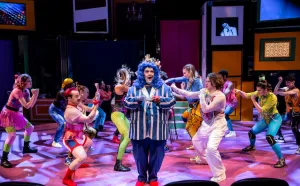
The impact of the media on the direction of Pippin’s life (and our lives by default) is handled extraordinarily well in Act One, which alone deserves six stars, because it is so powerful! Perhaps what the producers see as being the modern-day Satan is the fact that the average person can become addicted to the media and manipulated by it. Media influencers may have too much impact on how we may think and feel about our lives. Mixing news anchors with invented characters within the various video displays can make everything appear to be nonsensical and depersonalized. I really liked the overlay of Uncle Sam’s pitch to join the military with the anachronism of Pippin going to war together with his brother Lewis in order to fight the Visigoths. Pippin even asks the question, “Why is there the need to kill people in order to change their views on life and make them believe in Christianity?” This pays homage to the original time period when “Pippin” was written: when the Vietnam War was in full throttle and when the belief that playing video games can serve to desensitize us as human beings and thus can be an important means of prepping soldiers for war. But the everlasting nature of this tale has to do with the fact that the media promotes FOMO (a/k/a fear of missing out). This includes coveting what we don’t already have—and not knowing exactly what are missing in life or what we really need to feel good about ourselves and our time on earth.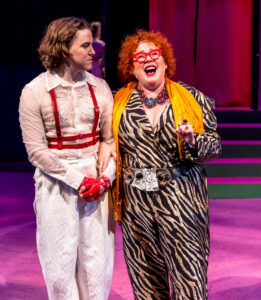
But the energy feels different between the first act with the second. It wanes as Pippin’s life becomes more conventional and family-oriented, if not more humdrum. Perhaps using some of these TV screens to flash scenes of “Leave It to Beaver” or “Father Knows Best” or “The Brady Bunch” would have made the point in the second act that marriage and family life is not what you see on television. But perhaps that’s the opposite of what today’s production is trying to say! Thus, I could argue that the lack of steam towards the end (finale excepted) is meant to make a point: that in spite of the show’s superficial frivolity, this musical is not meant to be a dreamlike fantasy but a dark lament, having to do with what the average person might think about life and its satisfaction.
This is a meaty script, and perhaps its thrust is that we, as human beings, will never know the answers regarding who or what we are and what our purpose is meant to be—and that is where faith comes in. The intentional illumination of the Cross during certain scenes can symbolize the importance of God and God’s message in counteracting Satanic influences. However, the question on the table is this: Did Pippin look for meaning in all the wrong places and thus, knowingly or unknowingly, succumb to evil influences? Or did he try his best to understand what the human condition might mean during various phases of his lifecycle? Was fulfilment actually staring him in the face for much of the time? Or was his existence just an illusion: as real as the flicker on our computer monitors? Would acknowledging this phantasm make his life any less valuable—and, by extension, would it make our own lives any less worth living?
A lot has been invested in this contemporary musical. Considering the many issues which it raises and the wonderful acting and songs and music that it uses to further the plot, you should take the time to see it!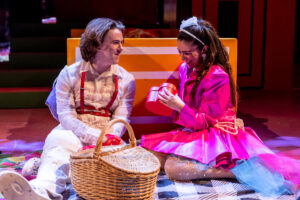
“Pippin” is playing through June 25, 2023, in the North Theatre at the North Shore Center for the Performing Arts, 9501 Skokie Boulevard, Skokie.
Tickets range from $39 to $106.
Tickets for guests 25 years old and younger are available at half-price.
 Performance Schedule:
Performance Schedule:
Wednesdays – 1:00 p.m.
Fridays – 8:00 p.m.
Saturdays – 8:00 p.m.
Sundays – 2:00 p.m.
Additional performance: Saturday matinee, June 10 at 2:00 p.m.
For more information and to purchase tickets, go to https://www.musictheaterworks.com/pippin/ or call the Music Theater Works Box Office at the North Shore Center, 847-673-6300.
Group discounts are available for groups of 10 or more by contacting 847-920-5360.
For general information and to learn about Music Theater Works other offerings, please visit https://www.musictheaterworks.com/.
Health and safety protocol: All guests are recommended to wear face masks during the performance.
Box Office: 847-673-6300
To see what others are saying, visit www.theatreinchicago.com, go to Review Round-Up and click at “Pippin”.






More Stories
“The Firebugs” reviewed by Julia W. Rath
“The Book of Grace” Al Bresloff with another from Paul LIsnek
“The Last Five Years” MILWAUKEE